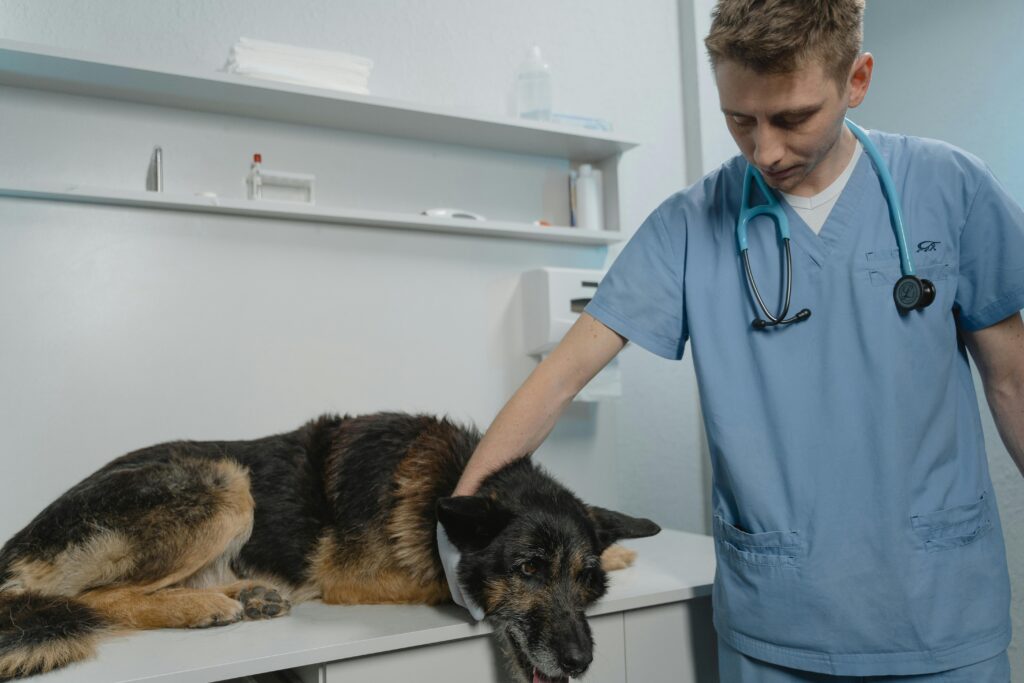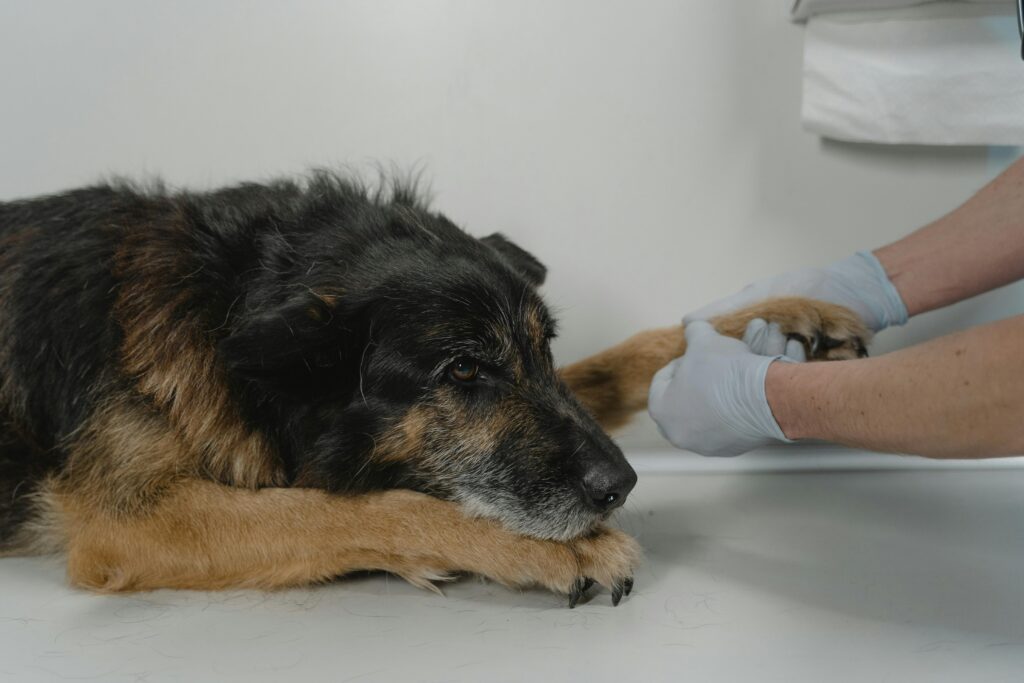If you’ve already welcomed your pup into your home, the next thing you will need to do is find a vet. Whether you’re bringing home a new puppy or caring for your senior dog, the right vet can make all the difference. In this guide, we’ll cover everything you need to know about choosing a vet to ensure your dog has a positive experience.
How do I choose the right vet for my dog?

Choosing the best vet for your dog involves more than picking the nearest clinic. It’s about finding someone who understands your dog’s specific needs and has a philosophy that aligns with your values as a pet parent. Here are some key things to consider when looking for a veterinarian:
Experience & Training
Before choosing a vet, it’s always best to ask about their experience. Some vets specialise in certain breeds or conditions, so it’s helpful to find one with expertise relevant to your dog’s needs. But experience goes beyond just medical training—nutrition also plays a huge role in your dog’s overall health, and not all vets receive extensive education in this area.
Depending on their training background, some vets may have limited knowledge of canine nutrition, which can influence the advice they provide. Additionally, many veterinary clinics sell specific brands of pet food and may receive commissions or incentives for promoting them. This doesn’t mean their recommendations aren’t valuable, but it’s important to be aware of potential conflicts of interest. When discussing your dog’s diet with your vet, don’t hesitate to ask questions, research independently, and consider a holistic approach to ensure you’re making the best choice for your pup’s health.
Location and Accessibility
Choose a vet that’s conveniently located to ensure quick and easy access when needed. In an emergency, having a clinic nearby can reduce stress and get your dog the care they need faster. Beyond emergencies, a conveniently located vet makes regular check-ups, vaccinations, and routine visits more manageable. If you travel frequently or live in a remote area, consider a vet with extended hours to ensure ongoing support for your pet’s health.
Services Offered
A good veterinary practice should offer a range of services, including vaccinations, parasite control, dental care, spaying and neutering, and surgery. It’s also helpful if they provide emergency care or can refer you to an emergency clinic when needed.
Communication and Comfort
Pay attention to how well the vet communicates with you. A great vet listens to your concerns, explains treatment options clearly, and makes you feel comfortable asking questions. You should feel confident in your vet’s ability to care for your dog.
Reviews and Recommendations
When choosing a vet, seek recommendations from family, friends, breeders, or local pet groups to get firsthand insights into their experiences. Online reviews can also be a great resource, offering a broader perspective on the clinic’s quality of care, customer service, and overall reputation. Pay attention to recurring themes in reviews—whether positive or negative—as they can indicate consistent strengths or potential red flags. Additionally, consider visiting the clinic in person to get a feel for the environment and see how the staff interacts with both pets and their owners.
What should I expect during the first visit?

Your dog’s first visit to the vet is crucial in setting the tone for future visits. Ideally, you’ll want to create a calm and positive experience for your doggo. To help you prepare, we’ve rounded up everything that might happen during your dog’s first visit to the vet.
- Physical Exam: The vet will check your dog’s overall health, including their weight, coat, teeth, eyes, and ears. They’ll also assess their heart and lungs, listen for any irregularities, and check for any signs of illness or discomfort.
- Vaccination and Parasite Control: If your dog is a puppy or hasn’t had recent vaccinations, the vet will administer vaccines and discuss a parasite control plan (for fleas, ticks, and worms).
- Discussion of Health History: You’ll likely be asked about your dog’s medical history, diet, exercise habits, and any concerns you may have. This helps the vet gain a full picture of your dog’s needs.
- Advice on Nutrition and Care: The vet may offer tips on feeding, grooming, and exercising to ensure your dog stays happy and healthy.
How often should my dog see the vet?

While the number of visits will entirely depend on your dog’s age, breed and medical history, here are a few general guidelines.
- Puppies: Puppies need frequent vet visits, especially in the first year, to complete their vaccinations, monitor growth, and address any early health concerns.
- Adult Dogs: For healthy adult dogs, a vet visit every 12 months is typically sufficient for annual vaccinations, health checks, and preventive care.
- Senior Dogs: As your dog ages, they may require more frequent visits every 6 to 12 months. Senior dogs are more prone to health issues, so routine checks are vital for early detection and management of conditions like arthritis and heart problems.
How do I make my dog enjoy going to the vet?

It’s not uncommon for dogs to feel anxious about going to the vet, but there are things you can do to make the experience more enjoyable.
- Positive Reinforcement: Bring treats and praise your dog throughout their visit. Creating positive associations with the vet clinic will help your dog feel more comfortable.
- Frequent, Low-Stress Visits: Take your dog to the vet for “just-because” visits, where they get treats and praise but don’t have an exam. This helps them build positive associations with the veterinarian.
- Familiarisation: Before your appointment, take your dog to the clinic to meet the staff and get familiar with the environment. This can reduce anxiety when it’s time for a real visit.
- Stay Calm: Dogs can pick up on your emotions, so staying calm and relaxed can help your dog feel less stressed.
Choosing the right vet for your doggo
When it comes to choosing the right vet for your dog, there is no one-size-fits-all answer. Choosing the right vet is an essential step in ensuring your dog’s health and happiness. A great vet provides expert care, answers your questions, and helps keep your dog healthy. Consider veterinary experience, services, and your dog’s personal needs to find a vet that’s right for you. Regular vet visits will also help you stay ahead of any potential health issues and keep your dog feeling their best.

